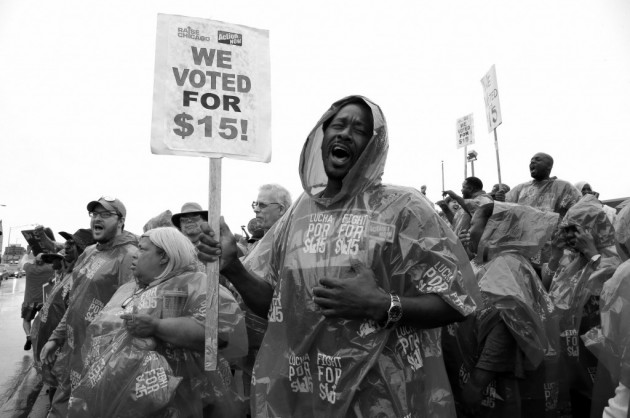I, as a “team member” of the lovely retail store, Target, believe there are no gains from drastically raising minimum wage. Many of my acquaintances are working part-time and some of crazy ones are working a full-time job, while also attending college as a full-time student. Many of them do this as a necessity to pay for college, rent and mostly going to bars on any night they don’t work.
Many teens use minimum wage jobs to get a foot in the door for bigger and better opportunities. According to the US Department of Labor, between 2007 and 2009, the minimum wage changed three times from $5.15 to $7.25. The unemployment rate of teens age 16 through 19, rose from 8% to 25% from mid-2000’s to present time.
Raising the minimum wage may seem a great way to increase income for the poor, but it is only a shot in the arm when we need a true cure. In a study done by Joseph J. Sabia, he shows that raising the minimum wage is a failed stimulus and does not increase gross domestic product (GDP).
Raising minimum wage would increase high school enrollment in theory because it would take potential students who opt out for full time employment and give them opportunities to make subsistent wages through part-time work, freeing them to be full time students. According to Sabia that is not the case.
Increasing the minimum wage will make it less likely for teens to be hired for those important entry-level jobs because of the added inconvenience that they have harder schedules to work around and less experience. Increasing minimum wage reduces the benefit of firms and companies hiring younger workers because they already pay to give them proper training. At Target, for instance, just knowing the workings of a computer with which most post-secondary students already are familiar requires training those without a post-secondary education.
Minimum wages have no effect on salary based positions. Therefore many citizens would keep the same pay, but when they go to a restaurant or want to buy groceries they see their totals increase. Private companies have one thing on their mind, profit. If their expenses increase then they will find ways to make their income rise with it. That creates higher prices. That stresses the incomes of those who are on permanent fixed incomes such as retired citizens.
Raising the minimum wage would do more harm than it would good. It may help those benefitting from the higher wages for a short term, but when the cost of living increases with it, the benefit is short term. Employees in general will be laid off because the businesses need to clear up some capital in order to pay for the higher minimum wages forced upon them. It is hurting the workers who are suffering lay-offs as businesses try to adjust to the new wages, and the consumers suffering from the higher prices when they also are making stagnant incomes or having no income due to the lack of jobs. There’s no doubt that the intentions of minimum wage boosters are good, but there needs to be more research in the actual implementation of increasing minimum wages rather than the “perfect world” theory.
Finally what would be the cure? When incomes increased the most in America there was a strong demand for employees. First a growing economy and second training that can be available through employers who could afford to do so if the entry-level jobs were not such a big part of their operating costs.
Minimum wage is not a cure but only a short remission from the decease of poverty.








